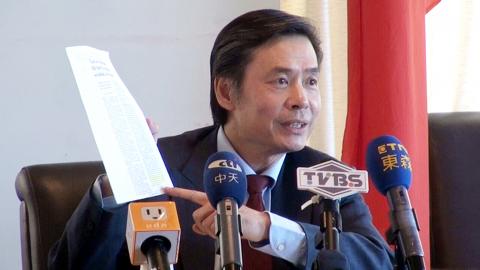|
King Pu-tsung berates
media over ‘Watergate’
NOT ACCURATE: The nation’s representative said a
US newspaper’s article did not refer to the current political turmoil as
Watergate, as some local media had reported
By Nadia Tsao, Lin Chun-hung and Stacy Hsu / Staff reporter in
WASHINGTON, with staff writer and CNA

Taiwan’s representative in
Washington, King Pu-tsung, points to a Washington Post article during a press
conference at the nation’s representative office in Washington on Friday.
Photo: CNA
Representative to the US King Pu-tsung
(金溥聰) yesterday quoted the author of a Washington Post report on the alleged
improper lobbying case involving Legislative Speaker Wang Jin-pyng (王金平) as
saying that some local media had twisted his words by saying the article equated
the case with the 1972 to 1974 Watergate scandal in the US, which involved taped
White House conversations and led to the resignation of then-US president
Richard Nixon.
“The Washington Post report did not directly refer to or describe the incident
[the alleged improper lobbying case] as ‘Taiwan’s Watergate.’ It merely stated
that the country’s opposition party, with which Wang had good ties, has
criticized President Ma Ying-jeou (馬英九) for his handling of the investigation
into the incident,” King said at a press conference on Friday.
The press conference was called shortly after the Taipei Economic and Cultural
Representative Office received an e-mail from the report’s author, William Wan,
in response to a letter it sent to him a few days earlier to explain the
differences between the two cases.
Wan, a Beijing-based correspondent for the English-language newspaper, wrote in
a Sept. 12 article: “Wang also had good ties with Taiwan’s opposition party,
which has criticized Ma for his handling of the investigation and referred to
the wiretapping scandal as ‘Taiwan’s Watergate.’”
Recent reports by FTV News and the Chinese-language Apple Daily newspaper have
misattributed the term to the article, while in fact it was derived from the
slogan of a placard hung on the wall of a conference room when Democratic
Progressive Party caucus whip Ker Chien-ming (柯建銘) held a press conference on
Sept. 9 to clear up the allegations, King said.
“Distorting foreign press reports and misattributing information are detrimental
to Taiwan’s image and the representative office feels obligated to clarify the
incident,” King said.
The allegations were brought by the Supreme Prosecutors’ Office Special
Investigation Division (SID) earlier this month, which accused Wang of lobbying
former minister of justice Tseng Yung-fu (曾勇夫) and Taiwan High Prosecutors’
Office Head Prosecutor Chen Shou-huang (陳守煌) not to appeal a non-guilty verdict
in a breach of trust case against Ker.
The opposition parties have cast doubts on the legitimacy and motives of the
division’s wiretapping of Ker, drawing parallels between the case and the
Watergate scandal.
It is the second time that King has defended the division’s handling of the
case, after he said at a monthly meeting with Washington-based reporters on
Thursday that the comparisons between the case and the Watergate scandal were
unsubstantiated.
“I have assured the US that no illegal wiretapping was used in the SID’s
investigation into the alleged improper lobbying case. The wiretap on Ker was
conducted based on a court-issued warrant as part of the division’s efforts to
investigate potential criminal offenses,” King said at the meeting.
King said he had sent an 11-page report to the US to clear up allegations of
misconduct on the division’s part in the case, which he said was the exact
opposite of the Watergate scandal, because the division had made public the
transcript of a wiretapped telephone conversation between Wang and Ker. Nixon
had initially refused to release the taped recordings of White House
conversations.
However, King’s defensive statements about the case have sparked fury among
members of the Judicial Reform Foundation.
Foundation executive director Lin Feng-jeng (林峰正) said King had deliberately
turned a blind eye to and played down the division’s perceived irregularities,
which had been met with severe public criticism and underlined flaws in the
nation’s judicial system.
Joseph Lin (林永頌), an attorney and a board member at the foundation, said King
had clearly confused his status as a Republic of China diplomat with his
position as former secretary-general of the Chinese Nationalist Party (KMT), of
which Ma is chairman.
“It’s debatable whether a diplomat should be involved in a political rift
between the president and the legislative speaker. I’m afraid King has no idea
what his job entails, otherwise he wouldn’t have commented on the matter before
the Control Yuan and the Ministry of Justice’s prosecutor evaluation committee
conclude their investigations into the case,” Lin said.
|
![]()
![]()
![]()